 Petzlover
Petzlover Safari is originated from United States but Tonkinese is originated from Canada. Both Safari and Tonkinese are having almost same weight. Both Safari and Tonkinese has almost same life span. Both Safari and Tonkinese has same litter size. Safari requires Low Maintenance. But Tonkinese requires Moderate Maintenance
Safari is originated from United States but Tonkinese is originated from Canada. Both Safari and Tonkinese are having almost same weight. Both Safari and Tonkinese has almost same life span. Both Safari and Tonkinese has same litter size. Safari requires Low Maintenance. But Tonkinese requires Moderate Maintenance
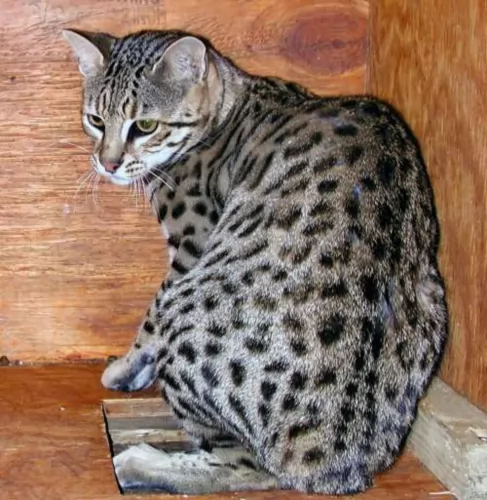 The Safari Cat, hailing from the USA, is one of the rarest breeds of cats. There are only about 70 of these cats registered at the International Cat Association.
The Safari Cat, hailing from the USA, is one of the rarest breeds of cats. There are only about 70 of these cats registered at the International Cat Association.
The Safari cat is a mix of a moggy and Geoffroy's cat. At first, the cat was used for research purposes by Washington State University but then cat breeders took over the development of the breed.
The name ‘Safari’ was chosen because of its wild look.
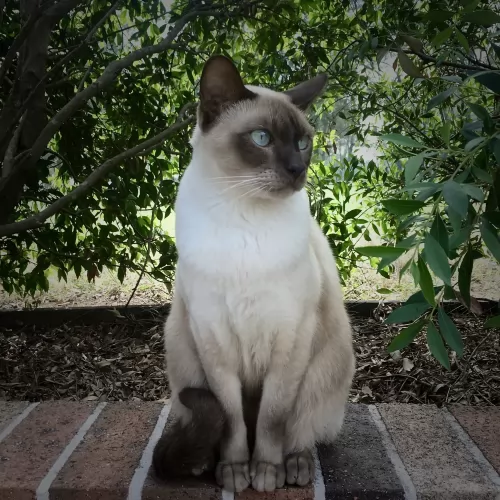 It was about in 1960 that a breeding program was established for these cats. The Tonkinese is a cat that hails from Canada and it was a certain Jane Batlett who was responsible for breeding this cat.
It was about in 1960 that a breeding program was established for these cats. The Tonkinese is a cat that hails from Canada and it was a certain Jane Batlett who was responsible for breeding this cat.
Also, Margaret Conroy, another breeder, set up her breeding program between a Burmese female with a Siamese. Both Conroy and Bartlett worked together on the breed and the Tonkinese came about. The Cat Fanciers Association recognized this cat breed in 1984.
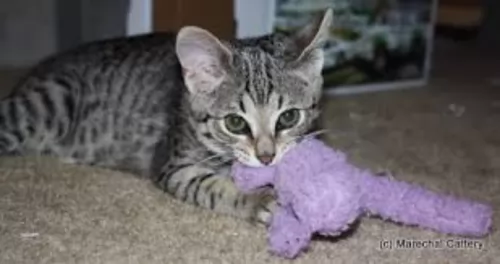 The hybrid Safari cat is a medium to large-sized cat that at first weighed in the region of 15kg, but the cat now weighs roughly 11kg.
The hybrid Safari cat is a medium to large-sized cat that at first weighed in the region of 15kg, but the cat now weighs roughly 11kg.
Its body is much like that of the wild parent, the Geoffroy – muscular and compact. The ears aren’t particularly large and are smallish, rounded ears with a fairly broad head.
It has a typical wild cat look and is a spotted or rosetted cat breed. Below the spots, the coat is a silvery grey shade.
The coat which is short actually comes in a variety of colors that come from both cat breeds. The eyes of this cat are either yellow or green. The Safari cat certainly has a wild cat appearance, because of the cross-breeding. This is a rare cat and because of this, there is no breed standard for it.
They can live to be between 17 and 20 years of age.
Even though one of the parent breeds is a wild cat, the Safari cat is described as an easy-going cat that can make a good pet.
The cat is very intelligent and playful and will enjoy swimming and climbing. It is for this purpose that he needs to have quite a large outside enclosure with a pool of sorts so that he can paddle.
There isn’t much information on their interaction with children and other pets in the home. While they are quite likely to make good pets where there are children, there would have to be supervision where there are small children. During play, these cats can bit. It would be extremely important to teach children to respect any animal and to be gentle and kind to them.
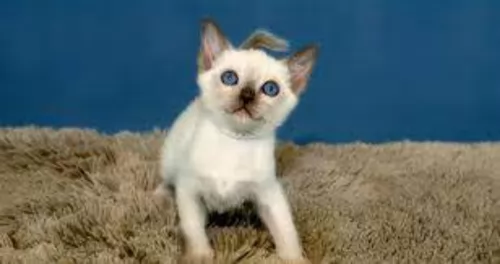 As a medium-sized cat, with a firm, muscular body, your Tonkinese will weigh between 2.5 – 6kg.The head is slightly rounded with fairly broad ears that are set wide apart.
As a medium-sized cat, with a firm, muscular body, your Tonkinese will weigh between 2.5 – 6kg.The head is slightly rounded with fairly broad ears that are set wide apart.
The eyes are bigger than the classic Oriental shape and can range from green to light blue in color.
The coat of the Tonkinese is short and close-lying and is soft and silky to touch. The mask, the ears, legs and tail are all darker than the body.
The Tonkinese cat breed is recognized by the Cat Fanciers' Association in 4 base colors - medium brown, champagne, blue and and platinum.
The Tonkinese cat, with one of its parents being the Siamese cat, just loves giving and receiving attention.
Active and social, he is an excellent choice for families with children and even other pets. They love just seeking out their human companions and lying down where they are.
They’re intelligent felines these, and you can even teach them some simple commands. Because of them being so very social, they don’t like to be left on their own – certainly not for the whole day while you go off to work.
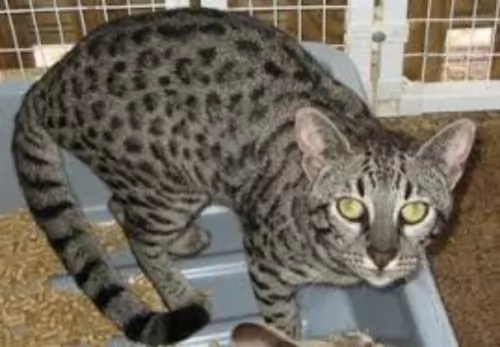 As a hybrid cat, your Safari is interesting alright, but unfortunately, you can’t ever be 100% sure of a hybrid cat. It needs careful consideration before you bring one into your home.
As a hybrid cat, your Safari is interesting alright, but unfortunately, you can’t ever be 100% sure of a hybrid cat. It needs careful consideration before you bring one into your home.
Apart from coming into the home from time to time, hybrid cats need an outside enclosure too that is securely fenced and gated and with a roof.
You made a decision to buy a cat with a wild side. It may live up to all your expectations but it may not either.
When you do research you find that the biggest number of behavioral complaints from owners of hybrid cats are about aggression issues and the refusal to use a litter box when indoors.
There is still a raging debate going on as to whether hybrids make suitable pets, but when you bring any animal into your home, as a responsible adult it is your job to provide well for it to ensure its happiness.
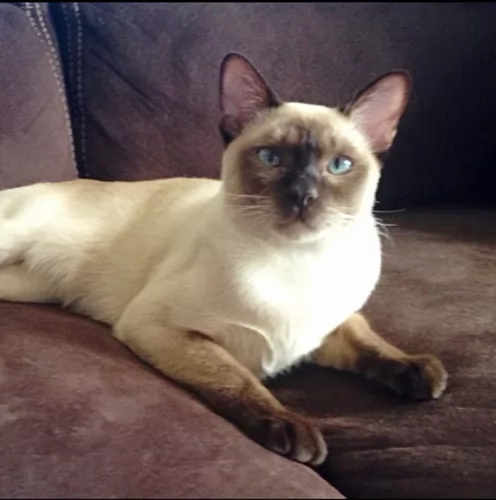 Tonkinese cats can be active and highly entertaining with their antics. When you laugh at them, they are encouraged to perform more.
Tonkinese cats can be active and highly entertaining with their antics. When you laugh at them, they are encouraged to perform more.
They are affectionate and intelligent cats and you will need to have toys for him. When he isn't playing, he likes nothing more than to be petted and pampered by his human family.
Your Tonkinese will get on well with children and other pets, and he generally makes a splendid pet for those who care well for him.
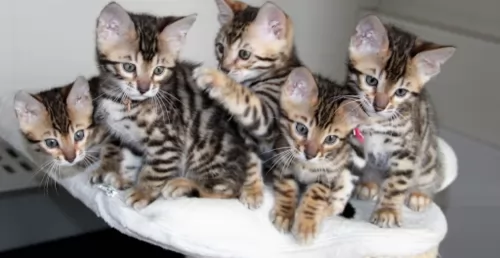 The Safari cat isn’t a particularly well-known breed so there isn’t much information on their health. They can suffer from the same illnesses as non-hybrid domestic cats.
The Safari cat isn’t a particularly well-known breed so there isn’t much information on their health. They can suffer from the same illnesses as non-hybrid domestic cats.
Certain hybrid breeds, such as the Safari, can sometimes have issues with reproduction as some cats are infertile. Domestic cats and wild cats have a different number of chromosomes and this results in reproductive problems, and stillbirths are quite common.
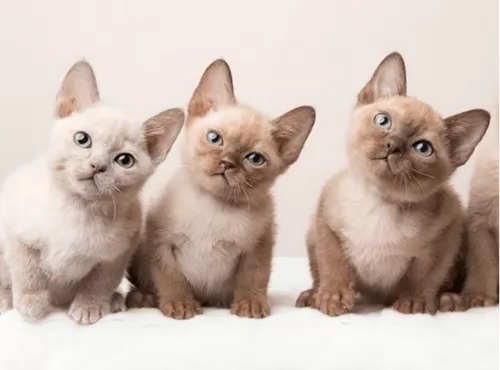 Tonkinese are generally healthy cats but they can be prone to eye problems such as gingvitis.
Tonkinese are generally healthy cats but they can be prone to eye problems such as gingvitis.
Because they are part of the Siamese family, they can succumb to some of the diseases that the Siamese battles with. These are asthma/bronchial disease, heart defects, lymphoma, and crossed eyes.
Lymphoma is linked with feline leukemia, a viral infection, and thankfully, more cats are being vaccinated for feline leukemia, so fortunately it is becoming less common.
Intestinal lymphoma affects the gastrointestinal tract and is the most common type of lymphoma in cats, being more common in older cats. Affected cats can suffer with weight loss, vomiting, and diarrhea. Get your cat to the vet as diagnosing this lymphoma will require the vet finding cancerous cells on microscopic examination.
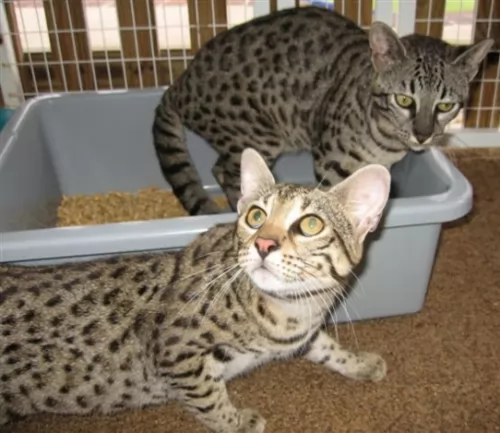 It is recommended that you brush this cat each week. He isn’t a big shedder but the brushing once a week keeps the fur in good condition, removing loose hairs and dust.
It is recommended that you brush this cat each week. He isn’t a big shedder but the brushing once a week keeps the fur in good condition, removing loose hairs and dust.
A high protein diet is imperative. Cats are carnivores and a meat diet is imperative. You can speak to your vet or a cat expert about feeding your Safari cat. Certainly, they need to be fed high-quality cat food. These foods are available in wet and dry form.
He will definitely need some raw meat. Make sure you understand the ingredients in some low- quality cat foods as corn for cats can be a problem for them, hard to digest and it could cause intestinal problems.
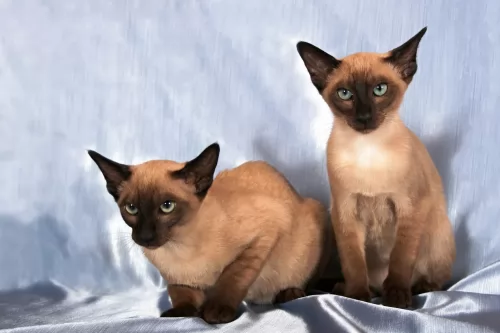 The Tonkinese has a short coat so a brush once a week will be sufficient for this cat as it just helps to brush away dust and loose hairs.
The Tonkinese has a short coat so a brush once a week will be sufficient for this cat as it just helps to brush away dust and loose hairs.
He will need a litter box and this will need to be kept spotlessly clean. Use a small rake, available from your vet or local pet shop, to rake up the cat’s feces.
When you first bring your Tonkinese cat home, you will at least need some of the basics to ensure his wellbeing. These are -
sleeping equipment – baskets or cushions in a nice warm, dry place for your cat.
A cat tree for climbing and a scratching post. Cats are natural scratchers so you can’t get angry with your cat for scratching. Instead, invest in a scratching post so that he doesn’t use your furniture to scratch on.
Food is such an important part of caring for a cat. The best type of cat food can ensure your cat has a strong immune system that allows him to not succumb to every cat sickness there is.
Cats are carnivores so ensure he has food high in meat. Sometimes it can be costly, but try to provide your cat with the best, most high-quality cat foods there are to ensure his good health and happiness.
A cat needs a constant supply of fresh, cool water night and day. The water should be changed regularly.